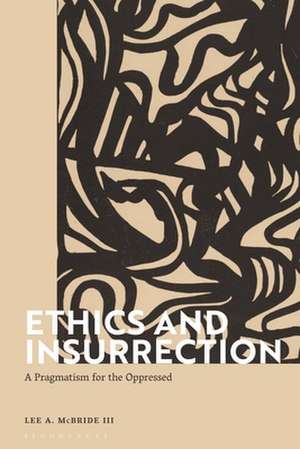Ethics and Insurrection: A Pragmatism for the Oppressed
Autor Lee A. McBride IIIen Limba Engleză Hardback – 27 ian 2021
| Toate formatele și edițiile | Preț | Express |
|---|---|---|
| Paperback (1) | 195.20 lei 6-8 săpt. | |
| Bloomsbury Publishing – 27 iul 2022 | 195.20 lei 6-8 săpt. | |
| Hardback (1) | 566.59 lei 6-8 săpt. | |
| Bloomsbury Publishing – 27 ian 2021 | 566.59 lei 6-8 săpt. |
Preț: 566.59 lei
Preț vechi: 814.65 lei
-30% Nou
Puncte Express: 850
Preț estimativ în valută:
108.43€ • 112.51$ • 90.63£
108.43€ • 112.51$ • 90.63£
Carte tipărită la comandă
Livrare economică 15-29 martie
Preluare comenzi: 021 569.72.76
Specificații
ISBN-13: 9781350102279
ISBN-10: 135010227X
Pagini: 144
Dimensiuni: 156 x 234 x 16 mm
Greutate: 0.38 kg
Editura: Bloomsbury Publishing
Colecția Bloomsbury Academic
Locul publicării:London, United Kingdom
ISBN-10: 135010227X
Pagini: 144
Dimensiuni: 156 x 234 x 16 mm
Greutate: 0.38 kg
Editura: Bloomsbury Publishing
Colecția Bloomsbury Academic
Locul publicării:London, United Kingdom
Caracteristici
Issues of race and racism are a major contemporary political and philosophical concern in the US and globally, evident in international coverage of the Black Lives Matter movement
Notă biografică
Lee A. McBride III is Professor of Philosophy at the College of Wooster, USA. He is the editor of A Philosophy of Struggle: The Leonard Harris Reader (Bloomsbury, 2020).
Cuprins
AcknowledgementsSource Acknowledgements and Abbreviations Introduction 1. (Moral) Philosophy in a Thoroughly Disenchanted Universe 2. An Insurrectionist Ethics: Critical Pragmatism and Philosophia Nata Ex Conatu 3. New Descriptions, New Possibilities 4. Empathy or Insurrection: Wielding Positive and Negative Affect 5. Evoking Race (to Confront Race-Based Oppression); Or, Adversarial Groups as Anabsolute 6. Building Traditions, Shaping Futures: Values, Norms, and Transvaluation EpilogueIndex
Recenzii
In Ethics and Insurrection, Lee McBride III brings together Deweyan pragmatic ethical naturalism and insurrectionist ethics. The result is a demystification of philosophy on behalf of those whose voices are ignored by standard philosophical discourse and a proposal to replace that discourse with a pragmatism for the oppressed.
Philosophical pragmatism today sometimes runs the risk of being bogged down in endless academic debates. To paraphrase James, we are now at a stage where it is no longer attacked as absurd, somewhat admitted to being true and obvious, and safely confined to the territories of exegesis and -isms warring with other -isms (as well as -icisms, of course). McBride's book is an attempt to break free from such constraints, carrying no other flag than that of the pragmatist who still believes in social progress and philosophy's role in working towards it. He offers a spirited defence of ethical naturalism that eschews materialist and scientistic dead-ends which will hopefully be taken up by a like-minded community of inquirers, academic and otherwise.
A provocative, creative and challenging account of ethical naturalism that makes us see why an ethos of insurrection is vital to any democracy and struggle for human liberation. Stepping over the dead-pan world of professional moral philosophy, McBride provides an optimism in the face of cruel choices. If there is a form of pragmatism that can provide motivation - the transvaluation of values - to struggle against forced prostitution, child servitude and racist exploitation, McBride purports provide its depiction. It takes the ethics of insurrection and shows its universality. With the ethos of the ethics of insurrection and democratic sensibilities, McBride fashions a walkway of arguments and pictures. McBride carves a space between critical pragmatist experimentalism and an insurrectionist ethics - the space is where we want our choices not to harm anyone as we test different ethical choices and where nothing allows for our choices to be anything but harmless.
Philosophical pragmatism today sometimes runs the risk of being bogged down in endless academic debates. To paraphrase James, we are now at a stage where it is no longer attacked as absurd, somewhat admitted to being true and obvious, and safely confined to the territories of exegesis and -isms warring with other -isms (as well as -icisms, of course). McBride's book is an attempt to break free from such constraints, carrying no other flag than that of the pragmatist who still believes in social progress and philosophy's role in working towards it. He offers a spirited defence of ethical naturalism that eschews materialist and scientistic dead-ends which will hopefully be taken up by a like-minded community of inquirers, academic and otherwise.
A provocative, creative and challenging account of ethical naturalism that makes us see why an ethos of insurrection is vital to any democracy and struggle for human liberation. Stepping over the dead-pan world of professional moral philosophy, McBride provides an optimism in the face of cruel choices. If there is a form of pragmatism that can provide motivation - the transvaluation of values - to struggle against forced prostitution, child servitude and racist exploitation, McBride purports provide its depiction. It takes the ethics of insurrection and shows its universality. With the ethos of the ethics of insurrection and democratic sensibilities, McBride fashions a walkway of arguments and pictures. McBride carves a space between critical pragmatist experimentalism and an insurrectionist ethics - the space is where we want our choices not to harm anyone as we test different ethical choices and where nothing allows for our choices to be anything but harmless.
